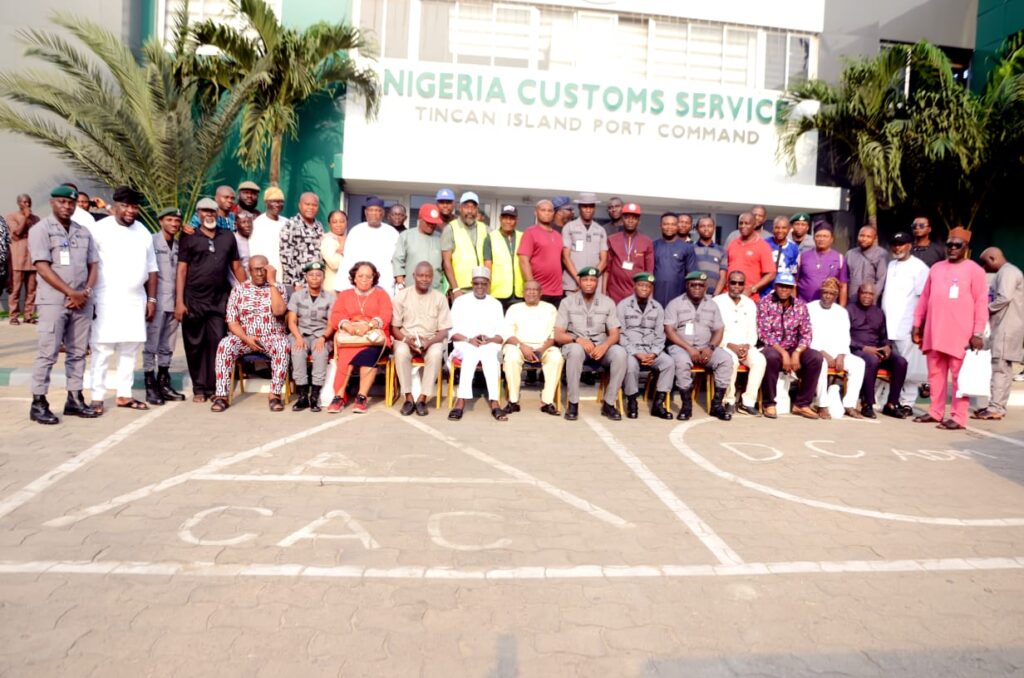Tincan Customs Hits N116 Billion Revenue in January, as Onyeka Sensitises Stakeholders on 4% FOB Levy, B’Odogwu System

The Customs Area Controller of Tincan Island Port Command, Comptroller Frank Onyeka, has engaged a broad spectrum of industry players on the implementation of the 4% Free on Board (FOB) levy and the introduction of the Unified Customs Management System, B’Odogwu.
The engagement sessions, held at the Command on Thursday, 6th, and Friday, 7th February 2025, brought together key stakeholders, including importers, Customs brokers, shipping agents, and trade experts from both the public and private sectors.
The interactive forums served as a platform for robust discussions on the operational impact of these initiatives and their role in enhancing efficiency and transparency within Nigeria’s trade and importation landscape.
Addressing participants, Comptroller Onyeka emphasised the significance of the 4% FOB levy, which is mandated under Section 18 of the Nigeria Customs Service Act 2023.
He explained that the levy applies to the value of imported goods at the point of shipment and is designed to bolster the operational efficiency of the NCS in alignment with international best practices.
According to him, the implementation of this levy will help streamline Customs processes, improve revenue collection, and ensure that Nigeria remains competitive in the global trade environment.
B’Odogwu: A Game-Changer for Customs Clearance
The Area Controller also highlighted the introduction of the B’Odogwu Clearance System, describing it as a revolutionary step towards modernising cargo clearance at Nigeria’s ports.
He noted that the system is designed to reduce bottlenecks, enhance compliance, and improve the overall ease of doing business at the port.
While the B’Odogwu system is yet to be fully operational, Comptroller Onyeka assured stakeholders that the rollout within the Command is imminent and that all necessary measures are being put in place to ensure a seamless transition.

Revenue Performance: N116 Billion Collected in January 2025
Providing an update on the Command’s revenue performance, Comptroller Onyeka disclosed that Tincan Island Port Command generated a total revenue of N116,412,735,766.23 in January 2025.
This represents a significant increase from the N88,430,126,122.76 collected in January 2024, reflecting a N27,982,609,643.47 increase, which translates to a 24.06% year-on-year growth.
Expressing optimism about the Command’s revenue trajectory, Comptroller Onyeka stated that the Command is well on course to surpass its 2025 annual target of N1.52 trillion.
He reaffirmed his commitment to maintaining the momentum through strategic reforms and enhanced compliance measures.
As part of ongoing reforms, Comptroller Onyeka assured stakeholders of his commitment to fostering a trade-friendly environment.
He declared that the era of multiple alerts is over, stressing the importance of honest declarations and thorough cargo examinations to ensure a more efficient and transparent Customs process.
He reiterated that stakeholder engagement remains a crucial pillar in the success of these initiatives.
“We will continue to engage with stakeholders to address concerns, enhance understanding, and ensure the smooth implementation of these policies,” he stated.
The Comptroller General of Customs, Bashir Adewale Adeniyi, MFR, has directed all Area Commands to initiate stakeholder consultations, underscoring the Service’s commitment to transparency, effective communication, and partnership in navigating the evolving landscape of international trade.







